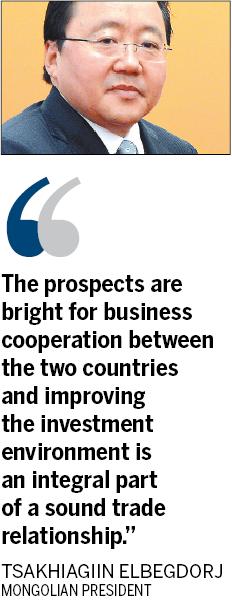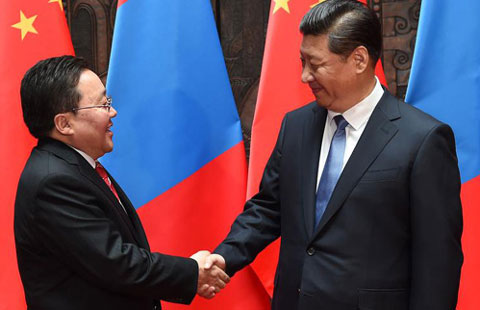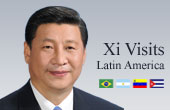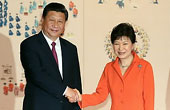
Xi's Mongolia visit will upgrade links between countries
Updated: 2014-08-19 03:34
By Qiu Bo in Ulan Bator and Zhao Shengnan in Beijing (China Daily)
Comments Print Mail Large Medium SmallWide-ranging talks planned on transportation, ports and energy

A number of key agreements are expected to be signed during President Xi Jinping's upcoming visit to Mongolia, which will signify the upgrading of the two neighboring countries' relationship, Mongolian President Tsakhiagiin Elbegdorj said.?
The deals will cover a wide spectrum including cross-border transportation, railways, port access, energy, mining and infrastructure. Private enterprises from both countries are also set to sign commercial deals, he said.
Elbegdorj made the remarks at a news conference on Friday in Ulan Bator, Mongolia, days before Xi's state visit to the country, which will begin on Thursday.
The two-day trip will be the first in 11 years by China's head of state to Mongolia and also Xi's second one-stop visit since taking office last year. His visit to South Korea in July was the only other occasion he went to one nation without visiting other countries during the same trip.
Elbegdorj expressed his hope that Xi's visit would boost Mongolia's cross-border transportation and infrastructure construction, as well as bilateral trade and investment.
He acknowledged the Mongolian economy's heavy reliance on mineral exports, appreciating China's support of its economic transformation and eyeing an increase in the export of processed minerals and agricultural products.
Mongolia has the largest coal reserves in the world, some of the largest copper reserves and large deposits of many other resources.
China has long been Mongolia's biggest trading partner and largest source of foreign investment. Trading volume between the two countries reached $6 billion in 2013, accounting for more than half of Mongolia's total foreign trade volume.
"The prospects are bright for business cooperation between the two countries and improving the investment environment is an integral part of a sound trade relationship," said Elbegdorj.
"Mongolia's State Great Khural (parliament) has recently revised investment laws, which significantly ameliorated the trade environment," he said, sending olive branches to Chinese investors. "We'll continue to push such work."
The shared border is the longest for each country, however the rail gauges differ — China's is narrower — meaning most goods must be transferred in a costly and time-consuming operation onto trucks.
Elbegdorj said the Mongolian government will try to deal with the gauge issue.
"Mongolian railway policy clearly states that any new railway must fit our gauge" while the parliament is entitled to discuss and determine whether to make an exception to narrow the gauge, he said.
Mongolia announced in March that it would build an international-standard narrow-gauge rail across its border with China to transport minerals from the Mongolian Gashuun Sukhait port to China's Gants Mod port.?
Speaking of Ulan Bator's "third neighbor" policy, which is to strengthen cooperation with Western countries and major international bodies, Elbegdorj said this policy is not in conflict with Mongolia developing cooperation with China and Russia.
"Landlocked by Russia and China, Mongolia has a unique geographical position," he said. "Developing cooperative relations with two neighboring countries is a priority of Mongolia's diplomacy."
He was also considering inviting more Chinese journalists to Mongolia to strengthen cultural exchanges and mutual understanding.
Elbegdorj, who has been in contact with Chinese officials since the 1980s, said he is an old friend of Xi.
"I appreciate that President Xi is very concerned about our bilateral ties and wish his visit a complete success."
Contact the writers at [email protected] and [email protected]
Related Stories
Xi's visit to unveil new roadmap for China-Mongolia ties 2014-08-19 00:43
Major Mongolia deals poised to be signed 2014-08-16 08:29
Chinese president to visit Mongolia 2014-08-14 16:21
Developing ties with China top priority on Mongolia's agenda 2014-08-14 10:34
Big Talk
Feature

Mongolian students experience Chinese culture in Hefei


